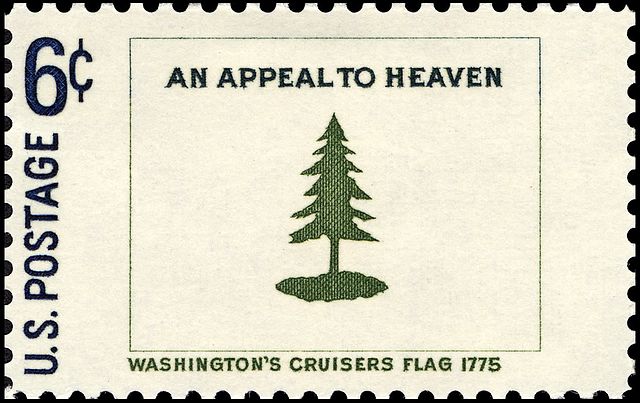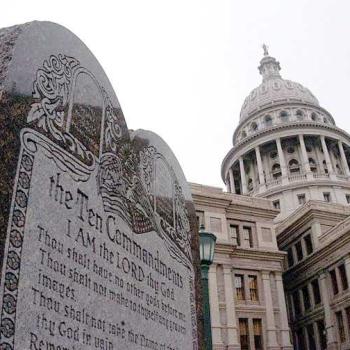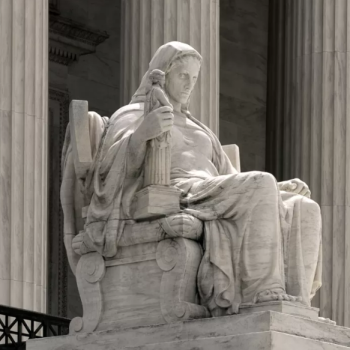The Appeal to Heaven Flag, also called the Pine Tree Flag, is a bit of genuine Americana flown during the American Revolution. It’s in the news now because a U.S. Supreme Court justice, Samuel Alito, displayed it beside his New Jersey beach home. And this has become a scandal. But why?
Over the past couple of decades the Appeal to Heaven Flag has become a symbol of Christian nationalism. Writing in Christianity Today (February 2021), Paul Miller wrote that “Christian nationalism is the belief that the American nation is defined by Christianity, and that the government should take active steps to keep it that way.” This ideology is built on the myth of the Christian nation, the utterly ahistorical belief that the United States was dedicated to Christianity at its founding and given a government built upon Christian principles. It was not. The founders deliberately created a secular nation that would not favor any one religion over others.
In recent years Christian nationalism has been an organized, and powerful, movement. One of its biggest backers is Leonard Leo, a wealthy lawyer long associated with the right-wing Federalist Society. Leo has channeled an enormous amount of money and influence into making conservative Christianity the established religion of the United States, in spite of the clear language of the First Amendment of the Constitution that bans establishment of religion. Just one of many examples of Leo’s work is the ongoing attempt to establish a public Christian charter school in Oklahoma, a project that is connected to both Leonard Leo and Samuel Alito. Further, it’s reported that Leo flies an Appeal to Heaven flag next to his summer home in Maine.
The Appeal to Heaven Flag: Historical Background
The original Appeal to Heaven Flag was designed by Gen. George Washington’s secretary, Col. Joseph Reed, in 1775, for use by the naval ships Washington commissioned. The pine tree on the flag is a symbol of peace taken from Native Americans of the Iroquois Confederacy, which included the Seneca, Cayuga, Onondaga, Oneida, and Mohawk people. The native North American white pine was also especially favored in shipbuilding.
The words “appeal to heaven” came from John Locke’s Second Treatise on Government, published in 1690. John Locke (1632-1704) was a British philosopher whose ideas greatly influenced the founders of the United States. The Second Treatise covers a great many topics — you can read about them here — but for our purposes we want to just look at his “appeal to heaven.” Very simply, Locke wrote that where there is legitimate government one may appeal to the law when one is wronged. But if the government is oppressive and is violating the natural rights of life, liberty, and property that belong to all people, it is time to “appeal to heaven.”
Locke wrote, “And where the body of the people, or any single man, is deprived of their right, or is under the exercise of a power without right, and have no appeal on earth, then they have a liberty to appeal to heaven, whenever they judge the cause of sufficient moment.” This is a call to throw off the government and establish one that respects and protects the peoples’ rights. Although Thomas Jefferson didn’t use the phrase “appeal to heaven” in the Declaration of Indepence, he clearly was drawing on John Locke’s Second Treatise in the opening paragraphs of the Declaration, written in 1776.
The Consent of the Governed
In a recent post on Why It’s Hard to Separate Church and State I wrote that human civilizations from their very beginnings assumed the authority of government came from religion. In Europe, the power of monarchs was said to come from God, and thus monarchs ultimately did not answer to an earthly authority. This was the “divine right of kings.” But Jefferson wrote of human rights in the Delcaration, “That to secure these rights, governments are instituted among men, deriving their just powers from the consent of the governed.” The authority of government does not come from God, in other words. This was revolutionary in 1776, and it also was an idea that came from Locke’s Second Treatise.
So it’s a bit ironic that an organized movement to re-connect government and God is using Locke’s “appeal to heaven” rhetoric in its symbolism. I don’t think Locke would join their club, if he were here. Christian nationalism is an extremist movement determined to establish Christian supremacy in the U.S., by force if necessary.
See, for example, “The Christian Nationalist Danger Behind the ‘Appeal to Heaven’ Flag” by Sarah Jones at New York magazine. Jones interviews scholar Matthew D. Taylor, author of the forthcoming book The Violent Take It by Force: The Christian Movement That Is Threatening Our Democracy. Taylor says that these days the Appeal to Heaven flag “is a symbol of an aggressive vision of Christian nationalism driven by spiritual warfare and prophecy and the intent to remake America in the image of a very conservative Christianity.” And, apparently, Supreme Court Justice Samuel Alito — author of the Dobbs decision that overturned Roe v. Wade — is fine with that.














